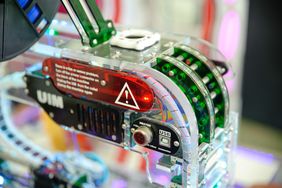Published: 15 January 2019
Robotics in nursing care: Volkswagen Foundation gives 1.15 million euros to interdisciplinary research project at the Bauhaus-Universität Weimar
An interdisciplinary team of experts working under Prof. Eva Hornecker (Professor of Human-Computer Interaction) and Prof. Wolfgang Sattler (Professor of Interaction Design) are examining robotic assistants for nursing care environments as part of the »RethiCare – Re-thinking Care Robots« project. The Volkswagen Foundation has donated €1,154,300 of funding to the project under its »Artificial Intelligence and the Society of the Future« initiative.
The use of robots in caring for elderly and sick people has become a subject of social discussion. This previously focused primarily on humanoid robots able to independently undertake care tasks. However, this approach has brought up new ethical and methodological issues: What effect does care automation have on the quality of life and wishes of the person being cared for? How can we ensure that robotic assistance is suitably and carefully designed? What challenges does this pose to robotics research?
These are questions that the research team headed by Prof. Eva Hornecker, Professor of Human-Computer Interaction at the Bauhaus-Universität Weimar's Faculty of Media, hopes to tackle in an interdisciplinary research group with product design lecturers from the Faculty of Art and Design, robotics specialists from the University of Southern Denmark, and sociologists from TU Chemnitz. Together they are aiming to develop a wide range of concepts for assisting staff in their work and boosting the emotional and physical well-being of those living in care institutions.
»Our project takes a much more pragmatic approach to the topic of robotics, going beyond the popular image of a miniature human that carries out tasks«, Eva Hornecker explains. »For example, robots can be integrated into furniture or other everyday objects. An intelligent table with robotic functions can automatically adjust itself, providing support and assisting in everyday life«. Working in close collaboration with two care institutions (one of which is the Diakonie Sozialdienst Thüringen gGmbH in Weimar), a user-oriented, creative design and development approach will be used to research robots with autonomously controlled degrees of freedom whose behaviour is intended to be proactive and adaptable.
As well as form and functionality, the design process will also include behaviour and reactions to sensory inputs. Innovative control schemes are being designed to prevent any clumsy behaviour from robots in the future. With this new approach to researching care robots, the researchers are seeking an alternative perspective through robots that do not replace human work but rather provide support and enable shared control between humans and robots.
Diverse interdisciplinary and international team of researchers
The creative and practical development of concepts and prototypes using a rapid prototyping approach is being undertaken by Prof. Wolfgang Sattler’s Professorship of Interaction Design at the Faculty of Art and Design. The demands and requirements of the resulting prototypes will be developed and systematised beforehand by human-computer interaction experts in conjunction with care institutions. The Bauhaus-Universität Weimar is working with Diakonie Sozialdienst Thüringen gGmbH in Weimar for this purpose. Colleagues at the Maersk Mc-Kinney Moller Institute at the University of Southern Denmark in Odense are responsible for robotics control and machine learning, and will be helping to produce functional prototypes. They will be working locally with the Department of the Elderly and Disabled for the city of Odense and its care homes. Dr. Andreas Bischof, sociologist at TU Chemnitz, will be assisting the development process and helping to examine the research findings.
About the Volkswagen Foundation’s funding
The Volkswagen Foundation is funding the project as part of its »Artificial Intelligence and the Society of the Future« initiative. This recognises and supports interdisciplinary groups of social and technical scientists that are building on examinations of the present to open up new perspectives and insights with a view to designing the future of society and technology.
The research project is planned to begin in April 2019. The total funding amount is €1,154,300, half of which will go to the Bauhaus-Universität Weimar. These funds will be used to pay for staff positions and for the materials required to build prototypes in the Faculty of Art and Design’s workshops.
For more information, please contact Dr. Eva Hornecker, Professor of Human-Computer Interaction:
Prof. Dr. Ing. Eva Hornecker
Email: eva.hornecker[at]uni-weimar.de
Kontakt
Bauhaus-Universität Weimar
Claudia Weinreich
Pressesprecherin
Tel.: +49(0)3643/58 11 73
Luise Ziegler
Mitarbeiterin Medienarbeit
Tel.: +49(0)3643/58 11 80
Fax: +49(0)3643/58 11 72
E-Mail: presse[at]uni-weimar.de
Web: www.uni-weimar.de/medienservice


